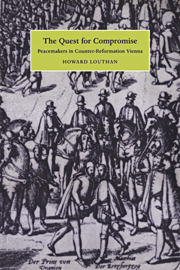Book contents
- Frontmatter
- Contents
- List of illustrations
- Acknowledgments
- A political and cultural chronology
- List of abbreviations
- Introduction
- PART I THE EMERGENCE OF AN IRENIC COURT
- PART II MAXIMILIAN II AND THE HIGH POINT OF IRENICISM
- Introduction
- 3 Hugo Blotius and the intellectual foundation of Austrian irenicism
- 4 Ordering a chaotic world: the reformation of the imperial library
- 5 Protestant ecumenism and Catholic reform: the case of Johannes Crato
- 6 Finding a via media: Lazarus von Schwendi and the climax of Austrian irenicism
- PART III THE FAILURE OF IRENICISM
- Conclusion: Storm clouds on the horizon: from the great milk war to the Thirty Years War
- Epilogue: The wider circle of irenicism
- Select bibliography
- Index
- CAMBRIDGE STUDIES IN EARLY MODERN HISTORY
Introduction
Published online by Cambridge University Press: 03 December 2009
- Frontmatter
- Contents
- List of illustrations
- Acknowledgments
- A political and cultural chronology
- List of abbreviations
- Introduction
- PART I THE EMERGENCE OF AN IRENIC COURT
- PART II MAXIMILIAN II AND THE HIGH POINT OF IRENICISM
- Introduction
- 3 Hugo Blotius and the intellectual foundation of Austrian irenicism
- 4 Ordering a chaotic world: the reformation of the imperial library
- 5 Protestant ecumenism and Catholic reform: the case of Johannes Crato
- 6 Finding a via media: Lazarus von Schwendi and the climax of Austrian irenicism
- PART III THE FAILURE OF IRENICISM
- Conclusion: Storm clouds on the horizon: from the great milk war to the Thirty Years War
- Epilogue: The wider circle of irenicism
- Select bibliography
- Index
- CAMBRIDGE STUDIES IN EARLY MODERN HISTORY
Summary
Though an irenic court emerged in Vienna under the leadership of Emperor Ferdinand I, the high point of this phenomenon came with his son Maximilian II. With a finer aesthetic sense Maximilian was better suited to patronize the work of the city's irenic courtiers. But there were also events occurring outside the court that contributed in their own way to the full flowering of irenicism during his reign. While Ferdinand had directed the affairs of the Reich in a more stormy and unstable season, Maximilian inherited the imperial mantle in a period of relative calm. With the successful conclusion of the princes' rebellion and the settlement two years later at Augsburg he could look forward to a new era of a more cooperative relationship with the imperial estates.
In the early years of his reign, however, Maximilian faced a final major challenge to the new federative order that was slowly emerging from Augsburg. The swashbuckling knight from Franconia, Wilhelm von Grumbach, staged an abortive uprising. The Grumbach crisis was a German variation of a European-wide phenomenon – the revolt of the discontented lower nobility against the growing power of the territorial state. Grumbach had conspired with Duke John Frederick II of Saxony-Gotha to recover the electoral dignity for the Ernestine branch of the Wettin family, which had been forfeited after the Schmalkaldic War. The revolt failed. Grumbach was captured and publicly executed in 1567. With the quelling of this insurrection there was a greater sense of stability within the Empire, and Maximilian was able to seal the breach between himself and the Reich's Lutheran estates. Maximilian had had a warm relationship with Duke Christoph of Württemberg.
- Type
- Chapter
- Information
- The Quest for CompromisePeacemakers in Counter-Reformation Vienna, pp. 49 - 52Publisher: Cambridge University PressPrint publication year: 1997



